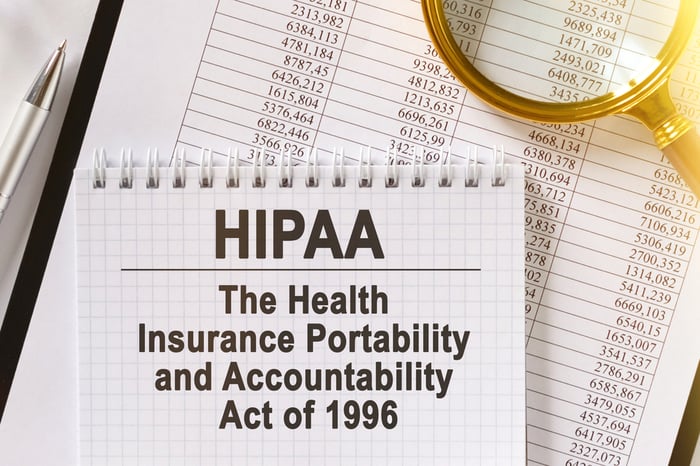Social Media + SEO: The Winning Combo in Digital Marketing for Doctors
Discover how combining SEO for doctors with social media marketing attracts patients and grows your practice. Learn expert strategies from...
Avoid multimillion-dollar fines and grow your medical practice confidently with HIPAA-compliant marketing strategies from PracticeBeat.
With data breach costs soaring high in 2025, HIPAA-compliant marketing is now your #1 advantage. Discover how PracticeBeat helps you grow your medical practice securely, ethically, and confidently.
HIPAA Compliance: The Legal, Financial, and Ethical Imperative
Why HIPAA Compliance Is Your Competitive Advantage in Healthcare Marketing
Why PracticeBeat Is the Ultimate Key to Success for HIPAA-Compliant Growth
Conclusion: HIPAA-Compliant Healthcare Marketing Starts with PracticeBeat

$10.93 million!
That's the average cost of a healthcare data breach in 2025—the highest across any industry, according to IBM.
Let that sink in.
For private practices and medical providers, this isn't just a distant headline—it's a costly reminder that HIPAA compliance in digital marketing is no longer optional. It's mission-critical.
Because this isn't just about government fines or compliance checklists, it's about protecting patient trust, preserving the continuity of care, and safeguarding your practice from reputational and financial damage that could take years to undo.

In today's digital-first healthcare landscape, every marketing touchpoint—your website, emails, Google Ads, analytics, and even chatbots—must be HIPAA compliant. And with over 88% of breaches caused by human error (often rooted in marketing missteps), what you don't know can hurt your practice.
Our experts at PracticeBeat break down exactly how to grow your practice with confidence, without risking a multimillion-dollar HIPAA violation. Because growth and compliance aren't mutually exclusive, with the right strategy (and the right partner), they go hand in hand.

HIPAA compliance for medical practice professionals is the foundation of trust, data integrity, and long-term practice success in today's digital-first healthcare landscape.
HIPAA, abbreviated from the Health Insurance Portability and Accountability Act, sets national protocols for safeguarding Protected Health Information (PHI) and electronic PHI (ePHI). It governs how healthcare organizations—and their marketing partners—collect, store, use, and share patient data.
This includes compliance with:
🔍 Pro Tip: Want a practical breakdown of how these rules apply to your day-to-day operations? Check out Chapter 2 of the HealthIT.gov Privacy & Security Guide (PDF).
HIPAA compliance is no longer just an ethical duty—it's a financial safeguard.
In 2024 alone, HIPAA enforcement resulted in penalties exceeding $ 9.9 million, with individual fines ranging from $137 to over $2 million. For practices with systemic or repeated violations, the financial risk is even higher.
The U.S. Dept of Health & Human Services (HHS) enforces a tiered penalty system, based on the severity and intent of the violation. These amounts are adjusted annually for inflation.

HIPAA Violation Tiers and Penalties (Source: HHS.gov)
📊 (View the most up-to-date HIPAA penalty structure here.)
Many practices assume HIPAA only applies to patient records or EMRs. But marketing tools—including your website forms, email campaigns, chatbots, online schedulers, CRMs, and even ad platforms—can fall under HIPAA jurisdiction if they collect or transmit PHI.
That means:
- One unsecured contact form...could lead to a six- or seven-figure fine, and lasting damage to patient trust.
HIPAA-compliant marketing agencies like PracticeBeat empower you to grow your practice confidently—without risking patient privacy, data security, or regulatory violations.
With HIPAA-compliant tools and workflows built into every touchpoint, you can focus on growing your practice without risking your license, your reputation, or your revenue.

In today's digital-first healthcare landscape, marketing isn't just about outreach—it often involves collecting, storing, and using patient data. That data—whether it's a name, email address, or appointment history—may qualify as Protected Health Information (PHI) under HIPAA.
Once PHI is involved, HIPAA regulations apply. And non-compliance? It can cost you financially, legally, and reputationally.
Many providers mistakenly believe HIPAA only applies to clinical systems like EMRs. But that's no longer the case. Today's marketing tools can just as easily cross the compliance line.
Here's where things get risky:
This HIPAA Journal article outlines how routine marketing practices can become legal liabilities if not HIPAA-compliant.
PHI refers to any health or demographic data that can be used to identify a patient. Even basic details qualify if connected to healthcare services.
Examples of PHI include:
- Patient nameIf your website, email platform, CRM, or ads collect or interact with this information, HIPAA compliance is non-negotiable.
Compliance isn't just about "not getting fined." It's about creating an ecosystem where every patient touchpoint is secure, legal, and trust-building.
Here's what that looks like in practice:
HIPAA compliance in marketing isn't optional—it's foundational. Done right, it builds trust, protects your reputation, and sets your practice apart in a world that values privacy.

Ensure sensitive health data stays secure and confidential across all digital touchpoints.
HIPAA-aligned systems reduce your exposure to cyberattacks and accidental PHI leaks.
Patients are more likely to engage and convert when they know their data is safe.
Non-compliance can trigger fines, lawsuits, and reputation-damaging investigations.
Well-structured, HIPAA-driven workflows often improve internal processes and accountability.
HIPAA rules continue to evolve. Stay ahead by reviewing the latest 2025 updates to ensure your healthcare marketing technology and vendors remain compliant.

HIPAA compliance isn't limited to legal fine print or backend security. In 2025, it must be baked into every stage of your healthcare marketing funnel—from content and lead capture to email campaigns and paid ads.
Here's how to protect patient privacy while still driving meaningful engagement across every channel:

Want to make sure your website protects both your practice and your patients? The experts at PracticeBeat have elaborated everything you need to know to keep your website HIPAA compliant.
📋 Want to make sure you're getting it all right?
Download our easy-to-follow healthcare marketing checklist that highlights the top HIPAA-compliant digital marketing best practices—so you can optimize your online presence, protect patient data, and boost conversions with confidence.
.jpg?width=700&height=366&name=shutterstock_2264933033%20(1).jpg)
In today's digital-first landscape, HIPAA compliance isn't just a legal safeguard—it's a decisive marketing advantage.
Patients are increasingly selective about where and how their data is shared. That means your ability to build trust, protect data, and grow ethically isn't just compliance—it's a strategy. And the best way to activate it? Partnering with a HIPAA-compliant marketing agency like PracticeBeat.
Here's why:
Bottom line? You don't have to choose between marketing performance and HIPAA compliance. With the right partner, you get both.
👉 Schedule a free HIPAA compliance assessment with PracticeBeat and start marketing smarter—without risk.
Compliance in digital marketing for doctors isn't a "nice to have"—it's a legal requirement. The risks of mishandling patient data are high, and the cost of a HIPAA violation can reach millions of dollars. That's why you need more than just a digital marketing agency. You need a partner who understands the nuances of healthcare, respects patient privacy, and builds trust at every touchpoint.
That's where PracticeBeat comes in, one of the best HIPAA-compliant healthcare marketing agencies. We're not just HIPAA-compliant, we're purpose-built for modern, secure healthcare marketing.
Built on secure Google Cloud infrastructure, your website and scheduling tools are fully HIPAA compliant, protecting every data point.
PracticeBeat websites go beyond compliance: they're HIPAA-compliant, ADA-accessible, mobile-optimized, and designed to convert.
👉 Here's why ADA compliance matters—and how your site can meet the mark.
From encrypted forms to secure hosting, we ensure PHI is protected across your entire digital presence, without sacrificing accessibility or performance.
Modern patients want convenience and expect to book care online. PracticeBeat makes that easy with HIPAA-compliant, 24/7 scheduling built right into your digital presence.
Offer customizable provider calendars, real-time availability, and smooth EMR/PMS integration without disrupting your workflow. Plus, capture valuable insights through compliant call tracking and lead attribution, so you never miss a potential patient.
👉 See if your EMR is supported and unlock effortless scheduling today.
Engage with your patients via encrypted text and email reminders, secure online forms, and compliant patient surveys—without worrying about data exposure or security breaches. We help you automate workflows and streamline operations, all while keeping compliance at the forefront.
👉 See how PracticeBeat streamlines HIPAA-compliant patient forms.
PracticeBeat keeps your front desk running smoothly by integrating directly with 70+ leading EMRs and Practice Management Systems. Our HIPAA-compliant platform enables 24/7 customizable online appointment booking across your website and patient touchpoints—without disrupting your existing workflow.
👉 Learn how PracticeBeat streamlines online scheduling and patient acquisition.
PracticeBeat is trusted by thousands of practices across the nation. From optimized websites to reputation management and compliant advertising, we provide a full-stack platform to attract, convert, and retain patients securely and efficiently.
With rising cyber threats and tightening regulations, compliance isn't just a risk reducer—it's a competitive advantage.
Ready to Grow Securely? Let's talk.
PracticeBeat helps healthcare providers market with confidence, not compliance concerns.
👉 Contact us today for your free HIPAA compliance assessment and discover how we can help your practice attract more patients—safely, ethically, and efficiently.

In 2025, digital marketing for private practices is essential. But with the average cost of a healthcare data breach now over $10.93 million, protecting patient data has never been more critical. HIPAA compliance isn't just a legal requirement—it's the foundation of patient trust, brand credibility, and sustainable growth.
Many practices still rely on marketing tools that weren't designed with HIPAA in mind. One unsecured form or misconfigured chatbot is all it takes to compromise patient data—and your reputation.
PracticeBeat changes that.
As a trusted HIPAA-compliant marketing agency to thousands of medical practices across the country, PracticeBeat empowers healthcare organizations to:
With rising cyberattacks and growing privacy concerns, robust compliance isn't just about avoiding penalties—it's a strategic advantage.
👉 Schedule your free HIPAA compliance assessment today and discover how PracticeBeat helps you grow confidently, ethically, and securely—without risk.

A: HIPAA compliance in healthcare marketing means ensuring that all digital channels—like websites, forms, emails, and ads—follow the standards set by the Health Insurance Portability and Accountability Act. This includes protecting patient health information (PHI), securing data transmission, and avoiding marketing tactics that could compromise data security.
A: It's not just about avoiding penalties—it's about building trust, protecting patient privacy, and ensuring ethical growth. HIPAA compliance helps prevent data breaches, maintains your reputation, and enhances patient engagement by ensuring they feel secure online.
A: Common violations include using non-secure website forms, sending unencrypted emails, sharing patient testimonials without written consent, and targeting ads based on health conditions. Even using tools like Google Analytics without proper configuration can risk non-compliance.
A: A HIPAA-compliant website uses SSL encryption (HTTPS), secure data hosting, encrypted forms, signed Business Associate Agreements (BAAs), and excludes PHI collection in unsecured channels. You can use this checklist to assess and improve your compliance.
A: Yes, but with caution. Avoid targeting based on health conditions or patient behaviors. Use contextual targeting (e.g., location, general interest) and ensure all vendors or platforms handling PHI have BAAs and follow HIPAA guidelines.
A: PracticeBeat offers end-to-end HIPAA-compliant marketing solutions—from secure websites and scheduling to encrypted communications and compliant ad campaigns. With built-in safeguards, EMR integrations, and expert guidance, it helps practices grow without legal or ethical risk.
A: You risk financial penalties (up to millions), data breaches, patient distrust, and reputational damage. Even a single unsecured form or unencrypted email can trigger a data breach or violation. That's why it's essential to work with HIPAA-compliant platforms and partners.
Discover how combining SEO for doctors with social media marketing attracts patients and grows your practice. Learn expert strategies from...
Learn about the top 7 errors in digital marketing for private practices make, and how PracticeBeat helps you correct them and grow your online...
Don't let your practice get buried on page two. Discover how a specialized Healthcare SEO agency like PracticeBeat can enhance your visibility,...